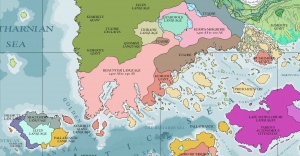Difference between revisions of "Rhaunvish Language"
Trismegistus (talk | contribs) m |
Trismegistus (talk | contribs) m |
||
| (6 intermediate revisions by the same user not shown) | |||
| Line 1: | Line 1: | ||
| − | [[File: | + | [[File:MapPytharniaLanguages1000AS.jpg|thumb|300px|Map showing the likely dispersion of ancient Rhaunvish and other ancient languages throughout southwestern [[Pytharnia]] around 1000 [[AS]].]] |
| − | Rhaunvish in the common name for the west Moigthe language which is part of the Donavish branch of Ancient High Gwenyan. It was a preliterate language spoken over a roughly 1150 years, from about 1400 AS to 250 [[AS]]. It is the parent language of the Moigthe languages of Erechóreb and thus of Classical Yophenthean and by this imperial language, the [[Yophenthean Languages]] of [[Asbardian Language|Asbardian]], Ambrasian, Ambrinquan, Nymenthonese, Glaikish, and Corundian. The relationship between Myernian and Rhaunvish is uncertain, but suspected to be lateral. Rhaunvish is remembered through divination and a few stone inscriptions | + | Rhaunvish in the common name for the west Moigthe language which is part of the Donavish branch of Ancient High Gwenyan. It was a preliterate language spoken over a roughly 1150 years, from about 1400 AS to 250 [[AS]]. It is the parent language of the Moigthe languages of Erechóreb and thus of Classical Yophenthean and by this imperial language, the [[Yophenthean Languages]] of [[Asbardian Language|Asbardian]], Ambrasian, Ambrinquan, Nymenthonese, Glaikish, and Corundian. The relationship between Myernian and Rhaunvish is uncertain, but suspected to be lateral. Rhaunvish is remembered through divination and a few stone inscriptions, and indirectly through oral tradition. |
After the exodus of the [[Goldenlings]] to [[Erechóreb]], the Durrhaunvish language arose from Rhaunvish in the valley after which it is named. Durrhaunvish lost much of the distinction between pietific and impietific terms and also lost most of the tempomutation. Other Moigthe languages also lost pietificity, tempomutation, and the inflections reduced from nominative, genitive, dative, and accusative cases, to nominative and oblique. Durrhaunvish persisted from about 250 AS to about 625 AI (about 875 years) until it succumbed to its sibling language, Classical Yophenthean. In this same region, Classical Yophenthean became a vulgate language and then the languages known as [[Asbardian Language|Asbardian]] and [[Ambrasian Language|Ambrasian]], respectively. | After the exodus of the [[Goldenlings]] to [[Erechóreb]], the Durrhaunvish language arose from Rhaunvish in the valley after which it is named. Durrhaunvish lost much of the distinction between pietific and impietific terms and also lost most of the tempomutation. Other Moigthe languages also lost pietificity, tempomutation, and the inflections reduced from nominative, genitive, dative, and accusative cases, to nominative and oblique. Durrhaunvish persisted from about 250 AS to about 625 AI (about 875 years) until it succumbed to its sibling language, Classical Yophenthean. In this same region, Classical Yophenthean became a vulgate language and then the languages known as [[Asbardian Language|Asbardian]] and [[Ambrasian Language|Ambrasian]], respectively. | ||
| Line 10: | Line 10: | ||
=Rhaunvish Language Files= | =Rhaunvish Language Files= | ||
| − | *[[Rhaunvish Language: Lexicon]] | + | *[http://wiki.worldofasdar.com/PDFs/Texts/Rhaunvish%2005%20Lexicon_%20General_%20Rhaunvish%20to%20English.pdf Rhaunvish Lexicon PDF] [[Rhaunvish Language: Lexicon]] (Link doesn't work due to faulty wiki plugin) |
=See Also= | =See Also= | ||
| Line 16: | Line 16: | ||
*[[Durrhaunve]] | *[[Durrhaunve]] | ||
*[[Gwenyan Languages]] | *[[Gwenyan Languages]] | ||
| + | *[[Kerspa-Kvé Language]], also known as Kerspa-Moigthe or East Moigthe, 1400 AS to 100 AS | ||
| + | *[[Luvasirgwer]] | ||
*[[Moigthe Languages]] | *[[Moigthe Languages]] | ||
*[[Rhaunve River]] | *[[Rhaunve River]] | ||
Latest revision as of 17:17, 17 September 2023
Rhaunvish in the common name for the west Moigthe language which is part of the Donavish branch of Ancient High Gwenyan. It was a preliterate language spoken over a roughly 1150 years, from about 1400 AS to 250 AS. It is the parent language of the Moigthe languages of Erechóreb and thus of Classical Yophenthean and by this imperial language, the Yophenthean Languages of Asbardian, Ambrasian, Ambrinquan, Nymenthonese, Glaikish, and Corundian. The relationship between Myernian and Rhaunvish is uncertain, but suspected to be lateral. Rhaunvish is remembered through divination and a few stone inscriptions, and indirectly through oral tradition.
After the exodus of the Goldenlings to Erechóreb, the Durrhaunvish language arose from Rhaunvish in the valley after which it is named. Durrhaunvish lost much of the distinction between pietific and impietific terms and also lost most of the tempomutation. Other Moigthe languages also lost pietificity, tempomutation, and the inflections reduced from nominative, genitive, dative, and accusative cases, to nominative and oblique. Durrhaunvish persisted from about 250 AS to about 625 AI (about 875 years) until it succumbed to its sibling language, Classical Yophenthean. In this same region, Classical Yophenthean became a vulgate language and then the languages known as Asbardian and Ambrasian, respectively.
Diachronic Flow
Paleo-Gwenyan → Ancient High Gwenyan → Early Erserce-Pallathantic → Donavish → Proto-Moigthe → Common Moigthe → Rhaunvish → Durrhaunvish
Rhaunvish Language Files
- Rhaunvish Lexicon PDF Rhaunvish Language: Lexicon (Link doesn't work due to faulty wiki plugin)
See Also
- Donavish Languages
- Durrhaunve
- Gwenyan Languages
- Kerspa-Kvé Language, also known as Kerspa-Moigthe or East Moigthe, 1400 AS to 100 AS
- Luvasirgwer
- Moigthe Languages
- Rhaunve River
| This article is a stub. It requires further development by the creator. |
